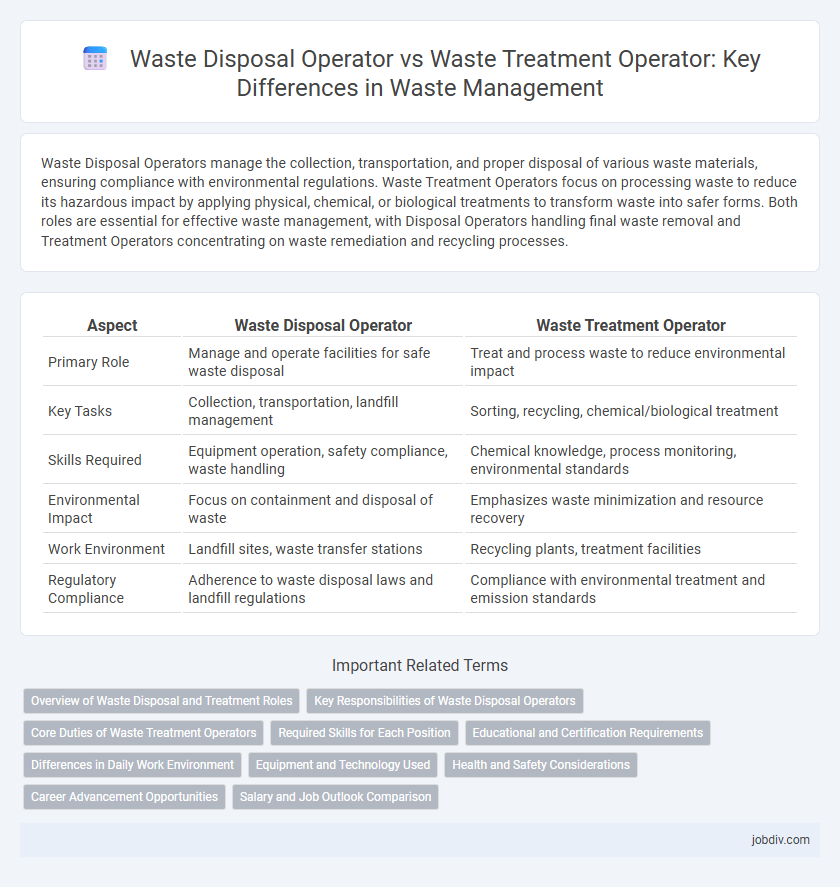Waste Disposal Operators manage the collection, transportation, and proper disposal of various waste materials, ensuring compliance with environmental regulations. Waste Treatment Operators focus on processing waste to reduce its hazardous impact by applying physical, chemical, or biological treatments to transform waste into safer forms. Both roles are essential for effective waste management, with Disposal Operators handling final waste removal and Treatment Operators concentrating on waste remediation and recycling processes.
Table of Comparison
| Aspect | Waste Disposal Operator | Waste Treatment Operator |
|---|---|---|
| Primary Role | Manage and operate facilities for safe waste disposal | Treat and process waste to reduce environmental impact |
| Key Tasks | Collection, transportation, landfill management | Sorting, recycling, chemical/biological treatment |
| Skills Required | Equipment operation, safety compliance, waste handling | Chemical knowledge, process monitoring, environmental standards |
| Environmental Impact | Focus on containment and disposal of waste | Emphasizes waste minimization and resource recovery |
| Work Environment | Landfill sites, waste transfer stations | Recycling plants, treatment facilities |
| Regulatory Compliance | Adherence to waste disposal laws and landfill regulations | Compliance with environmental treatment and emission standards |
Overview of Waste Disposal and Treatment Roles
Waste Disposal Operators manage the collection, transportation, and safe disposal of waste materials to designated landfill sites or incineration facilities, ensuring compliance with environmental regulations. Waste Treatment Operators focus on processing waste through physical, chemical, or biological methods to reduce volume, neutralize hazards, and enable recycling or safe release into the environment. Both roles are critical in the waste management industry, emphasizing environmental protection and resource efficiency.
Key Responsibilities of Waste Disposal Operators
Waste Disposal Operators are primarily responsible for the safe and efficient removal and transportation of waste to designated landfills or incineration sites. Their duties include operating heavy machinery to load and unload waste, ensuring compliance with environmental regulations, and conducting routine vehicle and equipment maintenance. Waste Disposal Operators play a crucial role in preventing environmental contamination by properly managing the disposal process and adhering to safety protocols.
Core Duties of Waste Treatment Operators
Waste Treatment Operators primarily focus on processing and treating waste materials to reduce environmental impact, employing methods such as chemical, physical, or biological treatment to neutralize hazardous substances. Their core duties include operating treatment equipment, monitoring system performance, and ensuring compliance with environmental regulations. Unlike Waste Disposal Operators who concentrate on collection and landfill management, Waste Treatment Operators play a critical role in transforming waste into less harmful forms or reusable materials.
Required Skills for Each Position
Waste Disposal Operators require strong physical stamina, knowledge of waste segregation techniques, and proficiency in operating heavy machinery like compactors and loaders. Waste Treatment Operators need expertise in chemical and biological processes, analytical skills to monitor treatment systems, and an understanding of environmental regulations for pollution control. Both positions demand safety awareness and adherence to regulatory compliance standards to manage waste effectively.
Educational and Certification Requirements
Waste Disposal Operators typically require a high school diploma or GED, with on-the-job training or vocational courses in waste management and safety protocols. Waste Treatment Operators often need more specialized education, including certifications in environmental science, hazardous waste handling, or water treatment technologies to ensure compliance with environmental regulations. Both roles may require state or federal licensing, with Waste Treatment Operators more frequently obtaining certifications such as the Certified Wastewater Treatment Operator (CWTO) credential.
Differences in Daily Work Environment
Waste Disposal Operators primarily manage landfill sites or incineration plants, handling the safe deposit and removal of waste materials in open or industrial outdoor settings. Waste Treatment Operators work mainly in controlled facility environments such as recycling centers or water treatment plants, where they process and transform waste through various mechanical or chemical methods. The key difference lies in the direct contact with raw waste and exposure to outdoor elements faced by Disposal Operators compared to the technical, process-driven tasks performed by Treatment Operators within indoor, regulated environments.
Equipment and Technology Used
Waste Disposal Operators primarily use heavy machinery such as compactors, bulldozers, and incinerators to manage landfill sites and ensure safe waste containment. Waste Treatment Operators utilize advanced technologies including bioreactors, chemical treatment tanks, and filtration systems to process and neutralize hazardous or recyclable materials. The technological focus of Disposal Operators lies in physical containment, whereas Treatment Operators emphasize chemical and biological transformation processes.
Health and Safety Considerations
Waste Disposal Operators prioritize safe containment and transport of hazardous materials to prevent environmental contamination and human exposure, adhering strictly to regulations such as OSHA standards. Waste Treatment Operators focus on processing waste to reduce toxicity, employing safety protocols like personal protective equipment (PPE) and monitoring toxic gas emissions to protect worker health. Both roles require comprehensive training in emergency response and risk assessment to minimize accidents and ensure compliance with health and safety legislation.
Career Advancement Opportunities
Waste Disposal Operators primarily manage the collection, transportation, and safe disposal of waste in compliance with environmental regulations, offering career advancement through roles in logistics coordination or supervisory positions within waste management firms. Waste Treatment Operators specialize in processing and transforming waste materials through chemical, biological, or physical methods, with career growth potential in technical expertise development, process optimization, and leadership roles in treatment facility management. Both career paths present opportunities for certification and specialization, such as hazardous waste handling or recycling technologies, which enhance promotion prospects and industry demand.
Salary and Job Outlook Comparison
Waste Disposal Operators earn an average annual salary ranging from $30,000 to $45,000, reflecting steady demand in municipal and industrial waste management sectors. Waste Treatment Operators command slightly higher salaries, typically between $35,000 and $50,000, due to specialized skills in processing and treating hazardous and non-hazardous materials. Both roles should see moderate job growth of approximately 5% to 7% through 2030, driven by increasing environmental regulations and sustainable waste management initiatives.
Waste Disposal Operator vs Waste Treatment Operator Infographic

 jobdiv.com
jobdiv.com